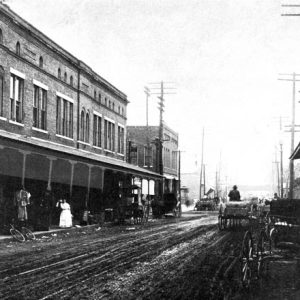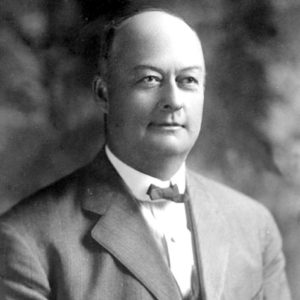calsfoundation@cals.org
Will Faucette (1865–1914)
aka: William Chesley Faucette
William Chesley Faucette was a politician, businessman, and the first mayor of Argenta, now North Little Rock (Pulaski County). He was a leader in the decade-long fight to separate Argenta from Little Rock (Pulaski County) after a forced annexation.
Will Faucette was born on August 13, 1865, in Pope Station, Mississippi, and was the fourth child of James Beard Faucette and Eliza Jane Hubbard. The Faucette family moved to Texas in 1878, then to Arkansas in 1880, living in Searcy (White County), Dover (Pope County), and Russellville (Pope County) within the space of a year. Around 1883, Faucette moved to the small settlement of Argenta on the north side of the Arkansas River opposite Little Rock. The rest of the family had followed by 1886.
Upon moving to Argenta, Faucette worked as a locomotive fireman with the recently established Little Rock and Fort Smith Railroad. In late 1887, he quit the railroad to enter business with his brother James Peter (J. P.). The brothers leased the Arlington Hotel in Argenta and later operated a boarding house and saloon. On April 24, 1886, Faucette married fifteen-year-old Lillie Dea Hallows, who also lived in Argenta. She died on February 7, 1887, soon after giving birth to a son who died a few months later. Faucette never remarried.
In 1890, Little Rock voted to annex Argenta after the community had had several unsuccessful attempts at incorporation. Because of a little-known law, only Little Rock residents were allowed to vote in the annexation election. Argenta contested the results. In 1892, the Arkansas Supreme Court ruled favorably for Little Rock and certified the annexation election results of 1890, thus allowing the capital city to annex Argenta by force.
In 1893, Faucette was elected to the Little Rock City Council as an alderman from the Eighth Ward, the name by which Argenta was then known. Faucette, often called an “Argenta Anarchist,” resigned from the council in 1896, citing Little Rock’s negligence in providing the north shore with adequate fire equipment and police protection. After resigning from the council, Faucette entered into various business ventures, including the organization of the North Little Rock Ice and Electric Company in 1896 and the Faucette Brothers Bank (later Twin City Bank) in 1901. The electric company was sold to the city in 1906 for $50,000. At the time of the purchase, the city had no revenue, and so Faucette issued IOU warrants until the city could pay.
Early in 1901, Faucette, his brother J. P. Faucette, Justin Matthews, and others still resentful over the 1890 annexation began to make plans for the separation of Argenta from Little Rock. Using the reason of creating a new special school district north of the river, Faucette and others incorporated the city of North Little Rock north of Argenta.
In 1903, Senator David King from northeast Arkansas introduced into the Arkansas General Assembly a bill commonly known as the Hoxie-Walnut Ridge Bill. The bill passed the state Senate and House of Representatives with little dissension, mainly because only King and Representative John Martineau, a friend of the Faucettes, knew of its true intent. The majority of the legislature believed that the bill, which allowed a city, or a portion thereof, to be annexed to another city located within a mile, would only impact Hoxie (Lawrence County) and Walnut Ridge (Lawrence County); however, the bill, signed into law by Governor Jeff Davis, could be applied to any city in the state.
The Argenta secessionists waited until the General Assembly adjourned before circulating petitions in Argenta and North Little Rock. Because of the way the law was written, only citizens of North Little Rock and the Eighth Ward (Argenta) were allowed to sign the petitions and vote in the annexation election, which was held in July 1903. Little Rock officials, after learning of the secessionist movement in Argenta, immediately filed a lawsuit challenging the constitutionality of the law. After many court cases, the Arkansas Supreme Court upheld the law in a decision in February 1904. North Little Rock soon thereafter annexed Argenta.
In April 1904, Faucette was elected mayor of the newly combined city of North Little Rock (which, in 1905, changed its name to Argenta) and was reelected in 1905 and 1907. He resigned in January 1909, vaguely citing the need for a vacation in his resignation speech. In September 1910, Faucette was unanimously selected to fill the unexpired term of his successor, E. A. Ramsey, who had resigned because of other commitments. Faucette resigned again in February 1911 to serve in the Arkansas House of Representatives, to which he was elected in late 1910. In the legislature, he successfully lobbied for the adoption of legislation to require favorable votes in both cities before forced annexation could occur. In 1917, the city’s name was changed back to North Little Rock, after Faucette’s brother convinced Argenta city officials that property values would increase because of the city’s association with Little Rock.
During Faucette’s tenure as mayor, the city Board of Health was established; new water and electric plants were constructed, and new natural gas lines were installed. Faucette also was instrumental in awarding a franchise for an electric trolley system and the building of bridges over a number of railroad crossings around the city.
Beginning in 1911, Faucette entered a number of medical facilities for a heart condition. He died on January 19, 1914, in Battle Creek, Michigan, while receiving treatment for his illness. Faucette is buried, along with his wife and son, in Oakland Cemetery in Little Rock.
For additional information:
Bradburn, Cary. On the Opposite Shore: The Making of North Little Rock. North Little Rock: City of North Little Rock, 2004.
Faucette Brothers Papers. Butler Center for Arkansas Studies. Central Arkansas Library System, Little Rock, Arkansas.
Nutt, Tim G. “Floods, Flatcars, and Floozies: Creating the City of North Little Rock, Arkansas.” Pulaski County Historical Review 41 (Summer 1993): 26–38.
Timothy G. Nutt
University of Arkansas Libraries
This entry, originally published in Arkansas Biography: A Collection of Notable Lives, appears in the CALS Encyclopedia of Arkansas in an altered form. Arkansas Biography is available from the University of Arkansas Press.
 Argenta Street Scene
Argenta Street Scene  William Faucette
William Faucette 




Comments
No comments on this entry yet.